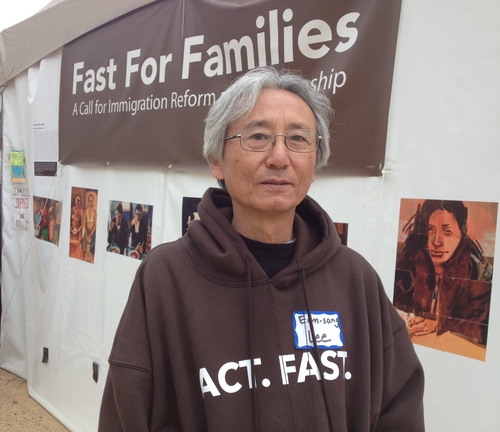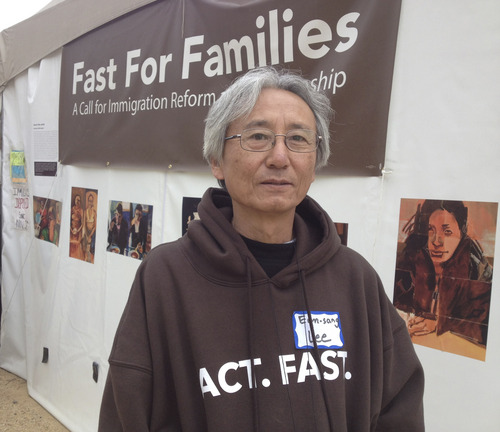This is an archived article that was published on sltrib.com in 2013, and information in the article may be outdated. It is provided only for personal research purposes and may not be reprinted.
Washington • A brown hoodie reminiscent of a monk's robes envelops Eun-sang Lee as he sits in a folding chair inside a dark tent on the National Mall. He hasn't eaten since Monday afternoon. Many of the other people wearing matching hoodies and clutching bottles of water have gone without sustenance for far longer.
Lee, a pastor for Salt Lake City's First United Methodist Church and a Korean immigrant, has just taken the baton — which in this case is a cross made of sticks — from a close friend who fasted for 22 days as part of a protest meant to pressure the U.S. House to pass immigration reform.
And while a doctor told those original four who refused to eat on Tuesday that they must step aside, six others, including Lee, will keep the Fast for Families going.
"Once you get into it, it's not that hard. Something carries you through," Lee said Wednesday. "You slow down and focus on what's important."
What's important to this collection of immigration-reform activists is a path to citizenship. The Democratic-controlled Senate passed a comprehensive immigration bill earlier this year, but the GOP-dominated House hasn't taken up the issue.
The Fast for Families began Nov. 12 and has attracted significant attention from religious leaders and Democrats. President Barack Obama and his wife, Michelle, stopped by the tent Nov. 29 to urge on those fasting. Rep. Joe Kennedy, D-Mass., is the first federal lawmaker to fast for one day in solidarity but isn't expected to be the last.
House leaders have said they will take up the issue of immigration early next year, starting with a bill on border security. It's unclear if GOP leaders will debate, much less vote on, a bill that would give immigrants in the U.S. illegally the chance to become citizens. None of Utah's four House members supports a path to citizenship, which is unpopular in conservative circles.
Lee, who immigrated to the United States in 1978, sees it as a moral issue.
"It is about families getting broken up," he said, referring to the deportation of some family members who leave spouses and children. "There's got to be a better way."
Lee watched as the Senate Judiciary Committee, with Sen. Orrin Hatch's support, passed immigration reform in June, and he participated in a protest in front of the Capitol sponsored by the National Korean American Service & Education Consortium, of which he is a board member.
This is his third trip to Washington and it was originally intended to be a one-day stop to show support, but when doctors told his friend Dae Joong Yoon that he had to end his fast, Lee agreed to step in, at least until Thursday afternoon when he has to get back to Salt Lake City and his congregation.
Going nearly three days without food is far from Lee's longest fast. In 2007, he gave up eating for Lent, subsisting only on water for 10 days in a move to show his spiritual discipline.
mcanham@sltrib.comTwitter: @mattcanham





